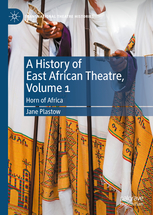Q&A with Jane Plastow about "A History of East African Theatre"
By Jane Plastow
Jane Plastow, Professor of African Theatre at the University of Leeds, recently published A History of East African Theatre, Volume 1: Horn of Africa (Palgrave Macmillan, 2020). Here, she answers some questions to introduce the book.
How has this book come about?
 This is volume 1 of two discussing the history of East African theatre from the beginning of the colonial period to the present day. It deals with the theatres of Djibouti, Eritrea, Ethiopia and Somalia/Somaliland. The book came about because I have been working – and at times living – in the region since 1984 and am aware that much more attention has been given to theatre in southern and west Africa than to East Africa, yet this region has some of the strongest, most influential theatres on the continent. The reason they have been overlooked so often is that much of the work is made in local languages and using local forms. Much is also unpublished. This is a passion project on which I have been actively working for some six years although it draws on my experience and friendships with East African theatre people going back more than half my lifetime.
This is volume 1 of two discussing the history of East African theatre from the beginning of the colonial period to the present day. It deals with the theatres of Djibouti, Eritrea, Ethiopia and Somalia/Somaliland. The book came about because I have been working – and at times living – in the region since 1984 and am aware that much more attention has been given to theatre in southern and west Africa than to East Africa, yet this region has some of the strongest, most influential theatres on the continent. The reason they have been overlooked so often is that much of the work is made in local languages and using local forms. Much is also unpublished. This is a passion project on which I have been actively working for some six years although it draws on my experience and friendships with East African theatre people going back more than half my lifetime.
What is the key argument that your book develops?
Well, there’s more than one. I guess the stand-out argument is that theatre in Africa becomes relevant, popular and impactful when it uses local languages and local performance forms, while the best known work internationally, written in European languages, reaches only a tiny elite of Africans and has been relatively unimportant in the region. I also discuss the key importance of getting people involved in the arts in their youth, since nearly all key players came to their passion for theatre as a result of school-based projects. Finally, I discuss the political significance of theatre in these nations; where in Somalia, for example, particular plays were credited with key roles in the election or overthrow of presidents; in Djibouti Somali language theatre played a big role in agitations for independence; in Eritrea during its thirty year liberation war both sides put huge efforts into making theatre a tool for political propaganda and in Ethiopia, particularly after the overthrow of the last Emperor, Haile Selassie, theatre was seen as the main forum for public debate of possible political futures. Sadly social scientists often ignore the importance of these art forms, to the significant detriment, I would argue of their political understandings and analyses.
What innovative or critical contribution does the book make to African Studies?
This is the first transnational study of theatre in any African region, seeking to demonstrate how supra-national factors, shared colonial experiences, shared religious perspectives or shared languages, for example, have influenced theatre-making across national borders. The historical framing also allows greater understanding of how early experiences have profoundly impacted on theatre developments in later years.
Give us one quote from the book that you believe will make us go and read it?
From the mid-twentieth century through to the civil war of 1990 Somali theatre was both a popular and a socio-political force […] hugely popular with the vast majority of the Somali-speaking population – rural and urban, educated and less so, old and young, men and women, in all nations where there were Somali populations. Prime Ministers and presidents attended the theatre, commended special performances and wept while watching. Plays were seen to have major effects on national policy, while leading abwaan, the post-playwrights who led the performing ‘bands’, were lauded as national sages speaking to, and educating, the national community (page 51).
